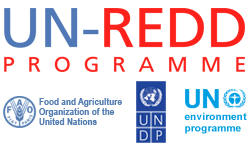

The UN-REDD Programme supports the SDGs agenda in a wide and integrated way. Analysis of the country results, presented in the following section, shows that UN-REDD technical assistance is supporting countries and stakeholders with the realization of at least seven different SDGs.
UN-REDD technical assistance, policy advice and knowledge management serve countries to advance SDG targets under SDG 13 (climate action) and SDG 15 (forest conservation & sustainable management), among others. Hence the recognition of UN-REDD as the UN platform for forest solutions to the climate emergency.
UN-REDD assists countries in integrating forest- and land-based climate change measures into national policies, strategies and planning (SDG 13.2), improving stakeholder and institutional capacities on climate change mitigation planning and actions (SDGs 13.3 & 13/b) and helping mobilize international climate finance at scale and enabling countries in accessing the Green Climate Fund (SDG 13/a). UN-REDD also promotes the conservation, sustainable management and restoration of forests across the world, aiming ultimately at halting deforestation (SDGs 15.1 & 15.2) while mobilizing investments and economic incentives to finance sustainable forest management (SDG 15/b).
Yet, UN-REDD also serves SDG 5 (gender equality) with equal intensity by systematically promoting the full and effective participation of women in decision-making (SDG 5.5), as well as women’s equal rights to land and natural resources (SDG 5/a). Internal UN-REDD gender mainstreaming tools and policies underpin such efforts across the portfolio. The UN-REDD Programme also supports SDG 16 (inclusive institutions and societies) by supporting the participation of Indigenous peoples, forest communities and civil society organizations in national policies and financing schemes for forest governance and climate action (SDG 16.7 & 16.10), as well as by empowering developing countries to participate and inform international climate governance institutions and negotiations (SDG 16.8).
UN-REDD also promotes SDG 12 (sustainable trade) by promoting policies and partnerships for deforestation-free commodity chains, encouraging countries and companies to adopt and monitor sustainable production and trade practices (SDG 12.6). UN-REDD also contributes to SDG 1 (fighting poverty) by promoting equal rights to forest lands and resources, notably with regards to Indigenous Peoples and Local Communities (SDG 1.4), as well as by mobilizing international climate finance towards developing countries engaged in forest conservation with local communities that are custodians of such forests (SDG 1/a).
Finally, UN-REDD is a prominent force in SDG 17 (partnerships for sustainable development) by stimulating a wide and rich diversity of collaborative arrangements and schemes, including multi-stakeholder policy platforms, institutional alliances, and public-private partnerships for forest conservation and climate action. UN-REDD helps developing countries mobilize and combine financial resources from multiple partners for national sustainability endeavours (SDG 17.3). UN-REDD also helps with the scoping and building of public-private partnerships for forest solutions to the climate emergency (SDG 17.17).
Furthermore, UN-REDD promotes the generation and sharing of knowledge on forest solutions across countries and stakeholders, including through South-South cooperation (SDG 17.6 & 17.16). UN-REDD equally builds capacities in developing countries to support national climate plans towards implementing the SDGs (SDG 17.9), along with enhancing policy and stakeholder coherence for sustainable development, notably through NDC design, implementation, atowardnd enhancement (SDG 17.14).
